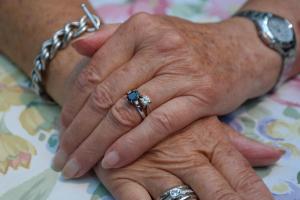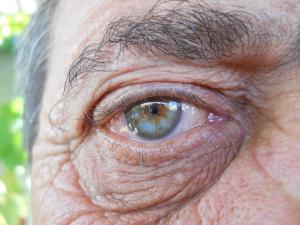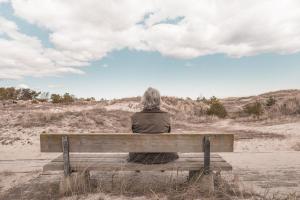by Amber Kevlin, RN | Sep 26, 2024 | Senior Home Care
Adapting to skin changes can become a challenge as we age, so good elderly skin care matters. As our skin texture changes, so does the care it requires.
As we age, skin becomes thinner, drier, and less elastic. It also takes longer to heal from wounds or injuries. Sun damage accumulates over the years as well. Elderly skin bruising becomes a common issue.
Prioritizing a proper senior skin care routine can help keep skin healthy, prevent future issues, and allows you to look and feel your best.
Some of the key skincare challenges for seniors include:
- Dryness – Skin produces less oil as we age, leading to excessive dryness, itchiness, and cracking.
- Wrinkles/Sagging – Loss of collagen and elastin causes skin to become looser and develop lines and creases.
- Sun Damage – Years of sun exposure raises skin cancer risk and creates age spots and rough texture.
- Bruising/Tears – Thinning skin results in increased vulnerability to injury and impaired healing.
Proper skin care also helps address these aging skin issues. A good daily routine includes:
- Gentle cleansing – Use a creamy, fragrance-free cleanser to avoid stripping away natural oils.

- Ample moisture – Apply a thick, oil-based moisturizer formulated for mature skin after bathing.
- Sun protection – Wear broad spectrum SPF 50+ sunscreen daily to limit further sun damage.
- Exfoliation – Remove dead skin cells weekly with a soft brush or washcloth.
- Wound care – Treat cuts and scrapes immediately with antibiotics to speed healing.
In addition to a good skincare regimen, healthy lifestyle habits also support aging skin:
- Stay Hydrated – Drink plenty of water to keep skin supple from the inside out.
- Eat Antioxidants – A diet rich in vitamins A, C, and E will protect skin from free radicals that cause dark spots and fine lines and wrinkles.
- Quit Smoking – Smoking accelerates wrinkles and age-related skin damage. Not only will this benefit your skin, but will help with overall health and wellness!
- Use Humidifiers – Added moisture prevents excessive dryness indoors, keeping skin sufficiently moisturized.
With the right routine and habits, seniors can keep skin healthy, minimize aging signs, and maintain a vibrant, youthful appearance for years to come.
Do you need help with elderly skin care conditions and treatments? My Choice Home Care can provide 24-hour care services at home, day or night shift care, or hourly care for you or your loved ones. Our team is prepared to conduct an at-home consultation to work with you and your family to develop a care plan suited for each individual. Send us a message here or call (828) 200-9000 to speak to someone today if you or a loved one would like to enjoy the benefits of living independently in your own home.
by Amber Kevlin, RN | Sep 13, 2024 | Senior Home Care
Gradual hearing loss becomes increasingly common as we get older. In fact, approximately one in three people between 65-74 years old suffers from some degree of older hearing loss issues.
This will not only strain communication and relationships, but has also been linked to cognitive decline, social isolation, and other health issues.
The good news is there are effective ways to prevent or manage hearing loss with early intervention and healthy lifestyle choices.
 Causes of elderly hearing loss can be a variety of factors that can affect many individuals. The aging process itself causes structural changes in the inner ear that impair its ability to transmit sound signals to the brain.
Causes of elderly hearing loss can be a variety of factors that can affect many individuals. The aging process itself causes structural changes in the inner ear that impair its ability to transmit sound signals to the brain.
Additionally, long-term exposure to loud noises can damage the delicate hair cells within the ear over time. Medical conditions like heart disease, diabetes, and cancer treatments may also play a role.
While some hearing loss may be inevitable with advanced age, here is what helps hearing loss in elderly:
- Use Hearing Protection – Wear earplugs/earmuffs when around loud equipment or environments like concerts.
- Avoid Loud Volumes – Keep television, radio, and headphone volumes at 60% or less of the maximum level.
- Manage Medical Conditions – Follow your doctor’s guidance to properly control diseases that can increase elderly hearing loss.
- Stay Physically Active – Aerobic exercise promotes good blood flow and heart health, which is vital for ear function.
If you do experience hearing difficulties, don’t ignore it. Have your hearing tested annually and explore treatment solutions like hearing aids, cochlear implants, or assistive listening devices.
Taking action early can help prevent or slow down future hearing decline.
When trying to communicate more clearly for those with elderly hearing loss, maximize communication by facing people directly, reducing background noise, and asking them to speak slowly and clearly.
Let friends and family know how best to engage with you. Keeping our ears healthy gets more challenging with age, but being proactive about prevention and treatment for hearing issues can help seniors stay socially connected and engaged in everyday life.
Do you need help with hearing loss in seniors you love at home? My Choice Home Care can provide 24-hour home care services, day or night shift care, or hourly care for you or your loved ones. Our team is prepared to conduct an at-home consultation to work with you and your family to develop a care plan suited for each individual. Send us a message here or call (828) 200-9000 to speak to someone today if you or a loved one would like to enjoy the benefits of living independently in your own home.
by Amber Kevlin, RN | Sep 5, 2024 | Senior Home Care
As we grow older, our elderly digestive system often doesn’t work as efficiently as it once did when we were younger.
A wide range of senior digestive health issues become increasingly common among the elderly population. Being aware of these conditions and their remedies are important for maintaining proper digestive health for seniors and improve overall well being, as well as quality of life.
Some of the most frequent digestive problems affecting older adults:
- Constipation – decreased muscle strength, inadequate fiber/fluid intake, and certain medications can leave seniors constipated. This may cause pain, bloating, and straining.
- Diverticular Disease – pouches (diverticula) bulge out from weakened areas of the digestive tract, often triggering inflammation, bleeding, or infections.
- Gastroesophageal Reflux Disease (GERD) – a weakened esophageal sphincter allows stomach acid to back up, causing heartburn, nausea, and difficulty swallowing.
- Inflammatory Bowel Diseases – conditions like Crohn’s disease and ulcerative colitis involving chronic gut inflammation tend to worsen with age.
- Malabsorption – as the elderly digestive system becomes less effective, crucial nutrients may not be properly absorbed from food.
Here’s how to improve digestion in elderly loved ones:

- Stay Hydrated – drink plenty of fluids daily to keep things moving smoothly through the digestive tract.
- Eat More Fiber – choose high-fiber foods like fruits, veggies, whole grains, and beans to prevent constipation.
- Avoid Trigger Foods – keep a log of foods that seem to worsen elderly gut health issues such as acid reflux, gas, diarrhea etc. and avoid them.
- Stay Active – regular light exercise and movement aids digestion and gut motility.
- Consider Probiotics – probiotic supplements can help restore beneficial gut bacteria.
- Discuss Medications – certain prescriptions and supplements may increase elderly digestive problems.
See your health expert if problems persist
If you experience severe, chronic, or worsening elderly digestive problems like bleeding, intense pain, or vomiting, make an appointment with your doctor promptly. Many digestive disorders are highly treatable when caught early. With some adjustments to diet, activity levels, and lifestyle, most elderly adults can get their troubling digestive issues under control.
Looking for help with digestive health for seniors you love at home? My Choice Home Care can provide 24-hour senior care services at home, day or night shift care, or hourly care for you or your loved ones. Our team is prepared to conduct an at-home consultation to work with you and your family to develop a care plan suited for each individual. Send us a message here or call (828) 200-9000 to speak to someone today if you or a loved one would like to enjoy the benefits of living independently in your own home.
by Amber Kevlin, RN | Aug 23, 2024 | Senior Home Care
As we grow older, maintaining healthy senior eye care becomes more difficult.
Age-related eye diseases and conditions are increasingly common among seniors. However, being proactive about elderly eye care can help prevent or slow the progression of many vision problems.
Common eye problems in senior citizens can include:
 Cataracts – A cataract is a clouding of the eye’s lens that causes blurred or dim vision. By age 80, over half of adults either have cataracts or have had cataract surgery.
Cataracts – A cataract is a clouding of the eye’s lens that causes blurred or dim vision. By age 80, over half of adults either have cataracts or have had cataract surgery.- Age-Related Macular Degeneration (AMD) – This disease damages the macula, the part of the eye needed for sharp central vision. AMD is a leading cause of severe vision loss in those over 60.
- Glaucoma – This group of diseases damages the optic nerve, often due to high intraocular pressure. Glaucoma causes gradual vision loss progression to blindness without treatment.
- Dry Eye – Tear production reduces with age, causing stinging, burning eyes. Dry eyes can also increase the risk of eye infections.
While some age-related changes are unavoidable, here are some proactive senior eye care steps to to maintain:
- Get Regular Exams – Annual eye exams allow early detection and treatment of diseases before vision loss occurs. Seniors over 60 may need exams every 6 months.
- Stop Smoking – Smoking doubles the risk of AMD and cataracts and worsens many other eye diseases.
- Eat Well – A nutritious diet with omega-3s, vitamins C and E, zinc, and lutein supports eye health.
- Use Proper Lighting – Adequate lighting reduces eye strain. Use brighter lamps/bulbs and add lighting for reading areas.
- Wear Sunglasses – 100% UV protection sunglasses prevent cataracts and macular degeneration.
Don’t ignore vision changes
Promptly see a senior eye health specialist if you experience vision changes, eye pain, double vision, etc. By taking a proactive approach, seniors can help safeguard their vision and maintain quality of life through their golden years. Prioritize eye care as you age!
Are you looking for help to prevent eye problems in seniors you love?
My Choice Home Care can provide 24-hour care, day or night shift care, or hourly care for you or your loved ones. Our team is prepared to conduct an at-home care consultation to work with you and your family to develop a care plan suited for each individual. Send us a message or call (828) 200-9000 to speak to someone today if you or a loved one would like to enjoy the benefits of living independently in your own home.
by Amber Kevlin, RN | Aug 19, 2024 | Senior Home Care
Senior mental health care is important as more and more older people are choosing to age in place rather than staying in assisted living facilities or nursing homes. Aging in place provides independence and comfort, however, it does pose some risks to mental health and wellbeing.
Loneliness, cognitive decline, depression and other elderly mental health issues are common in older people who live alone.
 Social isolation is the main mental health danger for elderly people who stay in their homes without proper support systems. People are meant to connect and have significant relationships throughout their lives.
Social isolation is the main mental health danger for elderly people who stay in their homes without proper support systems. People are meant to connect and have significant relationships throughout their lives.
Many elderly persons suffer from loneliness and lack of social participation because of issues such as family being far away, mobility problems, and loss of partners, friends, and peers. Chronic loneliness is a major elderly mental health issue leading to depression and anxiety. It can reduce seniors’ cognitive abilities and general physical health.
Depression is a frequent and neglected senior mental health disorder when living at home.
In some cases poor senior mental health presents as sadness, hopelessness and lack of joy in those certain activities that a person used to enjoy. In others, especially in older men, depression can show itself as irritability, anger, and tiredness. Grieving can also cause its own set of issues. Major family losses, loss of independence, and chronic pain can increase risks of depression in older adults.
Cognitive impairment is another problem.
It usually becomes worse when social isolation generally happens gradually in older adults. Social activities provide seniors with the cognitive activity necessary for maintaining intellect, memory, and other brain functions. Deprived of it, as well as of problems such as older hearing loss that hinders communication, the chances grow that earlier and more severe forms of dementia will set in.
Looking for senior mental health help at home? My Choice Home Care is a senior care service that serves clients in Macon, Jackson, and Haywood Counties in North Carolina. Counties served in Georgia are Rabun, Towns, and Habersham. Counties served in Upstate South Carolina are Oconee, Pickens, and Anderson. Visit MyChoiceHome.Care or call (828) 200-9000 to speak to someone today if you or a loved one would like to enjoy the benefits of living independently in your own home.


 Causes of elderly hearing loss can be a variety of factors that can affect many individuals. The aging process itself causes structural changes in the inner ear that impair its ability to transmit sound signals to the brain.
Causes of elderly hearing loss can be a variety of factors that can affect many individuals. The aging process itself causes structural changes in the inner ear that impair its ability to transmit sound signals to the brain.
 Cataracts – A cataract is a clouding of the eye’s lens that causes blurred or dim vision. By age 80, over half of adults either have cataracts or have had cataract surgery.
Cataracts – A cataract is a clouding of the eye’s lens that causes blurred or dim vision. By age 80, over half of adults either have cataracts or have had cataract surgery. Social isolation is the main mental health danger for elderly people who stay in their homes without proper support systems. People are meant to connect and have significant relationships throughout their lives.
Social isolation is the main mental health danger for elderly people who stay in their homes without proper support systems. People are meant to connect and have significant relationships throughout their lives.
Recent Comments